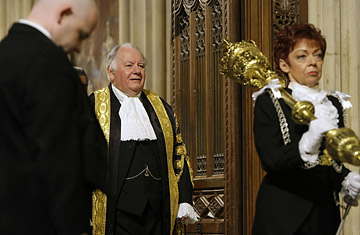
Speaker of the House of Commons Michael Martin, center, at the state opening of parliament in December 2008
You know things are getting weird when Britain's largest mass-market daily, the Sun, co-opts a regicidal 17th century republican who shut down Parliament at gunpoint as an avatar of democracy. But Oliver Cromwell's angry exhortation to MPs supplied the paper's front-page headline yesterday: "In the Name of God, Go."
British voters — or at any rate, those voters who work for Britain's robustly opinionated media — are calling for heads to roll as each day brings new revelations about MPs' overblown expense claims. Today, Michael Martin, the Speaker of the House of Commons, became the scandal's highest-profile victim, announcing that he will stand down in June, the first time a Speaker has been forced out in 300 years. The Speaker's primary role is to maintain discipline in parliamentary debates, but he also chairs the House of Commons Commission, responsible for advocating changes in the rules governing MPs. Those rules include the bloated system of allowances that has seen politicians charge for such essentials as a black glitter toilet seat and a chocolate Santa as well as make larger claims for mortgage moneys and the upkeep of ancestral piles. (See Britain's top 10 outrageous expense claims.)
Martin could have pushed harder and faster for reform, and his own extravagances have drawn criticism (his wife claimed more than £4,000 for cabs to buy food). But his ouster — Martin's resignation was forced by angry attacks from fellow MPs, which culminated in the introduction of a no-confidence motion against him — is unlikely to ease the tumult in Westminster or the anger across Britain. A number of MPs face being dropped or disciplined by their own parties; others will no doubt be voted out at the next general election (one is due within a year). Sir Paul Stephenson, head of Scotland Yard, said police may investigate some of the expenses claims. (See pictures of the British police.)
Details of MPs' expenses were due to be published by the authorities in expurgated form this summer. Instead, the uncensored information reached the opposition Tory-supporting Daily Telegraph and its Sunday sister paper. The imbroglio piles on the discomfort for Prime Minister Gordon Brown, who already trails the Conservatives in public affection. A general election isn't due until the spring of 2010, but Tory leader David Cameron has called for an immediate poll. Voters "want to elect a new Parliament. Their view is that swapping one person in a funny black costume for another funny black costume is not actually going to make all the difference," he said, referring to the Speaker's ceremonial black robes. (Read "David Cameron: U.K.'s Next Leader?")
Although Cameron's response to the public outrage has been deft, his own party has suffered collateral damage. He lost his senior adviser, Andrew MacKay, over revelations that MacKay and his MP wife submitted overlapping claims for their housing. Tory grandee Douglas Hogg announced today that he will stand down at the next election, after billing the public purse for maintenance of his moated Lincolnshire mansion. And there's evidence that all three main parties — Labour, Conservatives (Tory) and Liberal Democrats — could feel the backlash against Westminster's culture of venality at the European and local elections scheduled for June 4. One poll found that 27% of voters were considering switching their support to a small party, with the biggest winners being the Greens, the Eurosceptic UK Independence Party and the far-right British National Party.
The Queen is said to be "furious" about the damage to Britain's parliamentary democracy. Strange times indeed when the monarch and anti-royalist Cromwell find themselves on the same side.
